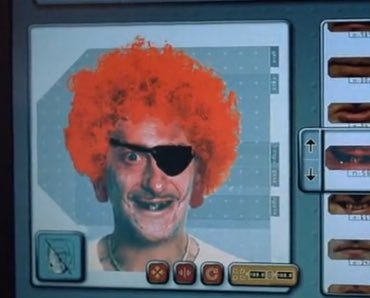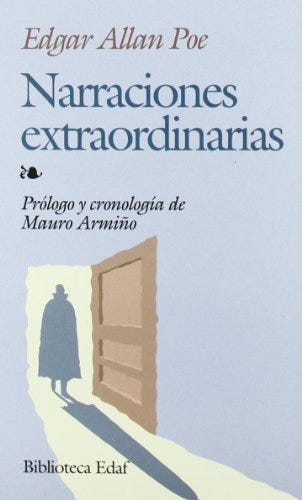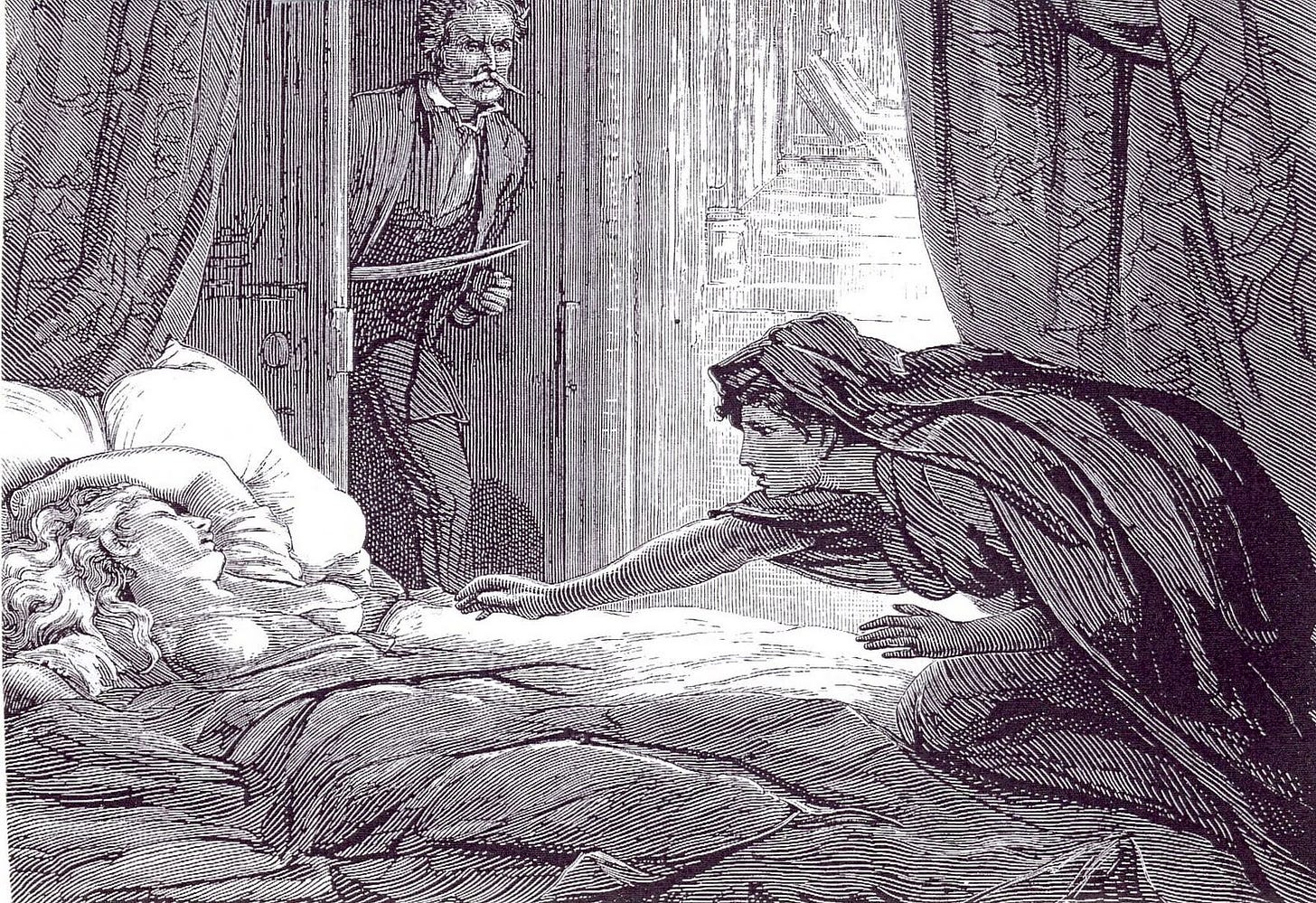The writers that stopped time
A brief recollection of authors that changed "The Weird" for me
I don’t consider myself to have a good memory. When I see in TV shows or books that a person is required to narrate some events in which they were involved, and they remember dialogs, clothes, time of the day, and the particular context of the situation — I have even seen this from real persons more than once — I always think that If I were involved in such cases, my statement would be something like the crazy police sketch in Johnny English.

But I definitely can remember the moments I read specific sentences from a story that made me stop and contemplate I was in the presence of something precious and unique. Let’s talk about those moments, about Authors that produced that illusion of time stopping and which feeling they conjured. I will talk about authors that I can clearly remember where I was when I read those lines, and still to this day, I carry with me every time I sit to write: the wish to move the reader as they once did with me.
The Fall of the House of Usher by Edgar Allan Poe
But if there is one thing I will never forget, it was the first time I read ‘The Fall of the House of Usher” by Edgar Allan Poe: I was in my bedroom, reading this guy I had heard so much about in my Literature class. It was a Spanish translation, but the words hit the same.
“There was an iciness, a sinking, a sickening of the heart — an unredeemed dreariness of thought which no goading of the imagination could torture into aught of the sublime. What was it — I paused to think — what was it that so unnerved me in the contemplation of the House of Usher? It was a mystery all insoluble; nor could I grapple with the shadowy fancies that crowded upon me as I pondered. I was forced to fall back upon the unsatisfactory conclusion, that while, beyond doubt, there are combinations of very simple natural objects which have the power of thus affecting us, still the analysis of this power lies among considerations beyond our depth.”
I clearly remember stopping at the end of this fragment for a while and telling myself, “Wow… this guy is good”, as if I was some record label guy in a dive bar listening to some Led Zeppelin live for the first time. There was a darkness in the description that pulled me in. The images of deserted lands, dead vegetation, and the crumbling House of Usher were vivid. After that read, Poe immediately became a major figure for what I would consider good or bad writing, and — as so many before — what my early writings leaned to. My prose was archaic, purple, and with too many adjectives, like a bad attempt at Lovecraft.

This was not the first time I read Poe. I discovered him by reading “The Tell-Tale Heart,” but at that moment, it didn’t speak to me. Those lines from The House of Usher story shook me, and I knew this was good writing. That was what good was for me, what I thrived for.
Carmilla by Sheridan Le Fanu
I found out about Le Fanu, most likely, by reading “Supernatural Horror in Literature” by H.P. Lovecraft — which in the unlikely case you haven’t read this yet, go for it; I’ll wait here. The Essay from Lovecraft was the main reason I ended up writing Weird Fiction. Le Fanu was depicted as one of the masters, and I asked my mom, who was about to travel to the USA for a couple of weeks, to bring me “In a Glass Darkly,” his short story collection. That’s where I read the following:
“I can’t have been more than six years old, when one night I awoke, and looking round the room from my bed, failed to see the nursery maid. […] I was vexed and insulted at finding myself, as I conceived, neglected, and I began to whimper, preparatory to a hearty bout of roaring; when to my surprise, I saw a solemn, but very pretty face looking at me from the side of the bed. It was that of a young lady who was kneeling, with her hands under the coverlet. I looked at her with a kind of pleased wonder, and ceased whimpering. She caressed me with her hands, and lay down beside me on the bed, and drew me towards her, smiling; I felt immediately delightfully soothed, and fell asleep again”

To this day is one of the most creepy depictions of a supernatural entity I have read. It was haunting and unforgivable. The story is equally beautiful and uncanny, but no matter what the story unfolded to, until this day, I hope I don’t find some eyes looking at me when I look down from my bed.
The White People by Arthur Machen
“What would your feelings be, seriously, if your cat or your dog began to talk to you, and to dispute with you in human accents? You would be overwhelmed with horror. I am sure of it. And if the roses in your garden sang a weird song, you would go mad. And suppose the stones in the road began to swell and grow before your eyes, and if the pebble that you noticed at night had shot out stony blossoms in the morning? Well, these examples may give you some notion of what sin really is.”
Arthur Machen, together with Algernon Blackwood, M.R. James, and Le Fanu, were the wonders hiding inside H.P. Lovecraft’s essay. This story from Machen, in particular, has so many strange things happening. After the dialog in the beginning about Sanctity and Sin, the narrator is a little girl that tells a series of strange happenings that become even more horrifying when one understands that everything is described through the veil of innocence. Read as part train of thought and part a fable, leaving the reader uneasy about what the girl experienced. One of the best weird stories I’ve read by far.
The Haunting of Hill House
There might be a chance that, as I did, The Haunting of Hill House was just a reference book until last year, when I finally read it. The opening is one of the best ones I’ve ever read in a novel (Together with One Hundred Years of Solitude’s one)
No live organism can continue for long to exist sanely under conditions of absolute reality; even larks and katydids are supposed, by some, to dream. Hill House, not sane, stood by itself against its hills, holding darkness within; it had stood so for eighty years and might stand for eighty more. Within, walls continued upright, bricks met neatly, floors were firm, and doors were sensibly shut; silence lay steadily against the wood and stone of Hill House, and whatever walked there walked alone.
The Haunting of Hill House, for me, read like a dream. I was constantly anxious, waiting for something to happen, as all the characters did. And while reading Edgar Allan Poe, I told myself, “This guy is very good; I would like to achieve this” When I read Shirley Jackson and her beautiful prose, I told myself, “I want to write like this.”
Her short story, The Intoxicated, confirmed this.
Books of Blood Vol.1 by Clive Barker
The dead have highways. They run, unerring lines of ghost-trains, of dream-carriages, across the wasteland behind our lives, bearing an endless traffic of departed souls. Their thrum and throb can be heard in the broken places of the world, through cracks made by acts of cruelty, violence and depravity. Their freight, the wandering dead, can be glimpsed when the heart is close to bursting, and sights that should be hidden come plainly into view. — Barker, Clive. Books Of Blood Omnibus 1
The opening line of the first story of Books of Blood made me stop. And so did the rest of the stories in this Volume. Barker’s prose is as beautiful as it is visceral. Reading books of blood is like admiring a Renaissance painting that, instead of oil paint, used blood. You can’t turn away from it. It's powerful and gross, but it’s very much sublime.
Father, Son, Holy Rabbit by Stephen Graham Jones
I remember this being the very first thing I read from SGJ. The writing was different. Quite simple. No extra decorations. Hemingway blunt. I remember thinking that I was not entirely surprised until I reached almost the end, and the whole experience of the story changed. It was a slap to the face. It reminded me of Cortazar's definition of the short story; it should win by knockout. And what knockout that was. There’s a special kind of mastery there. I still have many more stories from SGJ to read, so I’m looking forward to what other things I can find there.
This article was originally published in The Weird Companion Substack
